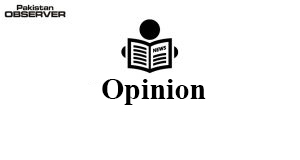Articles and letters may be edited for the purposes of clarity and space. They are published in good faith with a view to enlightening all the stakeholders. However, the contents of these writings may not necessarily match the views of the newspaper.
Politics of borrowed growth
The politics of relying on someone else’s assistance has always been central feature of economic management in Pakistan. This politics of borrowing from international economic organisations and friendly countries at time of budget deficit and balance of payment has permitted the country’s governing elite to avoid long term structural economic reforms and instead focus on quick fixes and creating a momentarily an illusion of good governance. This has led to an exorbitant rise in external and internal debt, which translated into high-rocketing inflation and a storm of indirect tax.
Although, getting aid is not something unusual, it’s utilisation matters. In Pakistan, every government, military or civil, prefer politics of quick fixes and direct foreign aid towards short-term projects. They never utilise this amount for human developments, enhancing outcome of social indicators like education, health, long term investment, energy etc.
Moreover, a sharp increase in their consumption to revenue generations and unsustainable resource generation and management has seriously damaged the economy. Simply put, if history is a guide, foreign aid and hence a borrowed growth has proved a disaster for Pakistan economy.
Instead of borrowing, the govt must curtail non-development expenditures, bring reforms in FBR and broaden tax net, diversify export base, take steps to document underground economy.
SHAH FAHAD KHAN
Via email
Forced land acquisition
There is no such law in UK, post Magna Carta reform, where private land could be occupied simply on the dictates and whims of the British monarchy. However, as an occupational force in subcontinent, such basic fundamental rights were denied to colonies.
The Raj raised an army consisting of British army officers and hundreds of thousands of local natives willing to serve as soldiers, loyal to them and protect their interests. Land allotments and titles were used to buy loyalties of natives willing to fight and oppress any local uprising or revolt. Before WW1, this was the primary objective for British Indian Army.
Land was acquired to build cantonments on periphery of every major city in the subcontinent. As an occupational force the Viceroy was given absolute powers to achieve the economical and political objectives of occupation, which was to transfer assets of India, including its gold and other natural resources to feed British economy. It is also an unfortunate reality that British Indian army, including its Muslim soldiers, were deployed in WW1 to occupy and defeat the Turkish Osmania army for capture of Jerusalem, despite the Muslims emotional attachment to Khalifate.
With passage of time, the British Raj wanted to regularise its transgressions through enactment of laws. The Land Acquisition Act of 1894 was one such draconian law. In 1941, Quaid bought House No-53 in Lahore Cantt, to devote more time to Punjab ML affairs. By 1944-45 on instructions of Viceroy, MAJ’s house was acquired under the Defence of India Rules. Such laws should have no place in a sovereign independent country like Pakistan which has a constitution and guarantees every citizen, basic fundamental rights, including right to own private property, unless he/she is willing to sell it.
MALIK TARIQ ALI
Lahore
Education as a business
Education has become a business in Pakistan. Establishing a private school offers a great opportunity for those looking to earn money. School, which were originally established for the purpose of providing education, are sidetracked and shift their aims to making as much money as possible. While owners of these schools continue to mint money, they are seriously jeopardising fate of the students. Everyone is aware of this situation and yet do nothing. The nation is being looted and yet we remain silent. Education has become a business and yet we don’t protest and keep silent.
TOKEERAH ZAFAR
Via email
Sindh’s refusal to join schemes
This is apropos news report published in your paper dated 18.12.2021 quoting Prime minister Imran Khan having condemned the Sindh government for not participating in the Rs. 106.1 billion Ehsas Ration Programme (ERP) starting from December 31and lamented that people of the province will not avail benefits of the programme aimed at providing relief to 20 million inflation hit people in the country.
Earlier the Sindh Govt also did not participate the Health card Scheme launched by the federal government in the provinces of KP & Punjab. It’s irony of the fate that Political tussle between the two governments of PTI and PPP has deprived the people of Sindh from availing benefits of these programmes which are being availed by other provinces without any fault on their part.
The provincial government if has any reservation about the subject programmes of the federal government or it has any constraints then it must initiate it’s own schemes in these areas to extend relief to the people of the province who are facing hardships to get better medical treatment and food commodities these days at cheaper rates.
People of Sindh are equally entitled for benefits that are being extended to people of rest of the country. It’s high time for the PPP provincial government to either participate in above schemes or launch it’s own without any further delay besides introducing other schemes for the downtrodden and marginalized sections of society who have always voted for it’s government. Good governance, eradication of corruption and merit are the main issues that must be addressed to generate requisite funds from the existing one to serve the people.
TARIQ MAJEED
Hyderabad, Sindh










